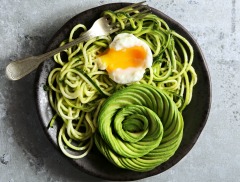Don't just meal plan... meal plan intelligently - with Meal Genius! Sign up for our free newsletter to get delicious recipes, sample meal plans and a whole lot more!
Mangos
Cultivated in India for several thousand years, mangoes come in hundreds of varieties.
With a taste described by many as a cross between a peach and a pineapple, mangoes make a delicious ingredient in sweet and savory salads, salsas, smoothies or desserts.
These tropical fruits are high in beta-carotene and other carotenoids, as well as vitamin C.
Be advised, these sweet fruits contain 24 grams of sugar per 1 cup serving.
Glycemic Index=51
Glycemic Load=8
Antioxidant Score (ORAC)=1,002
The Benefits
- Special diets: Autoimmune Paleo Diet, Elimination Diet, Gluten-Free Diet, Gluten-Free/Dairy-Free Diet, Grain-Free Diet, Low Acid Diet, Low Histamine Diet, Low Oxalate Diet, Low Starch Diet, Paleo Diet (Light), Paleo Diet (Strict), Pescetarian Diet, Primal Diet, Vegetarian Diet, Whole Food
- Excellent Source of: VitaminA, VitaminC
- Good Source of: Fiber, VitaminB6
- Preferences: No Fish, No Red Meat, No Pork, No Eggs, No Shellfish, No Gluten, No Nuts, No Seeds, No Soy, No Dairy, No Poultry, No Molds, No Coconut, No Pseudograins, No Citrus, No Nightshade, No Legumes, No Grains, No Corn, No Yeast, No Peanuts, Low Cholesterol, Low Fat, Low Sodium, Low Saturated Fat
Related Nutrients
Selecting and Storing
Look for fruit with an unblemished, yellow skin blushed with red. Underripe mangoes will ripen at room temperature in two to three days. Ripe mangoes will stay fresh for two to three days in the refrigerator.









